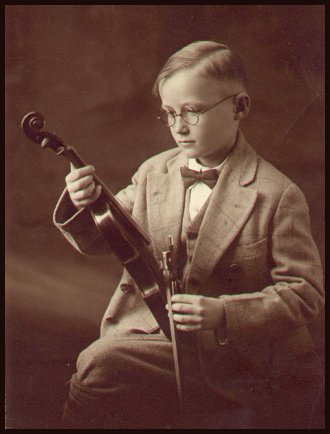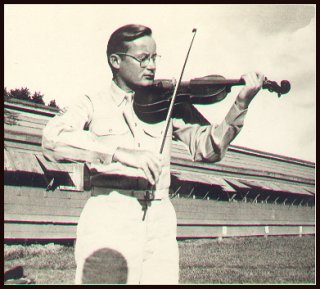![]() November 11, 2007
November 11, 2007
Sunday
In war, there are no unwounded soldiers.
                    — José Narosky, b. 1930
                        Argentinian writer of aphorisms
My father, Ludwig Edwin Yakimoff, was born on December 26, 1916, in Clifton Heights, Pennsylvania, a small community west of Philadelphia, not far from the city line. He had a sister Florence (whose stillborn twin did not, to my knowledge, have a name), and a brother Emil, both older than he. His parents, Emilia Bicziedeska and Karl Yakimoff, had come to America from Poland very early in the century. All of their children were born here.
As the youngest child, my father had certain advantages. By the time he was born, his parents had become established as ordinary small-town immigrant Americans, the kind of people we mean when we talk about what made this country great. They sacrificed to provide their children with the means to improve their status.
 My father was the son destined for an artistic career. He began studying violin early. (“Studying the violin” is different from “taking lessons.”) In a grandparents’ memory book I gave him when my sister’s first child was born, he wrote that his ambition as a child was to become “a symphony orchestra player,” although he also wrote that during his leisure time he “played baseball and practiced the violin — although not too much or too often,” and I’m assuming that the “not too much” part refers to the music practice. Nevertheless, so much was my father seen as a musician with concert soloist potential that his parents invested in the portrait you see here, taken in 1925.
My father was the son destined for an artistic career. He began studying violin early. (“Studying the violin” is different from “taking lessons.”) In a grandparents’ memory book I gave him when my sister’s first child was born, he wrote that his ambition as a child was to become “a symphony orchestra player,” although he also wrote that during his leisure time he “played baseball and practiced the violin — although not too much or too often,” and I’m assuming that the “not too much” part refers to the music practice. Nevertheless, so much was my father seen as a musician with concert soloist potential that his parents invested in the portrait you see here, taken in 1925.
Ludwig earned a degree in English from the University of Pennsylvania and a performance diploma from the Curtis Institute of Music. He financed this enterprise with scholarships and stints as a strolling violinist at swanky city restaurants such as Old Original Bookbinder’s on the waterfront. Upon graduation, however, he must have realized that a career as a classical musician was as uncertain as that of an actor, so he sought work as a teacher.
In the fall of 1941 he signed on with the Ridley Township Board of Education as a teacher of English and music. And then came Pearl Harbor, and my father tried to do what immigrant sons were encouraged to do — give something back to the country which had provided so much opportunity. He volunteered for military service but was rejected because of his poor eyesight, specifically a flaw that compromised depth perception and rendered his left eye virtually non-functioning.
But within a year the war effort intensified and every available fighting man was deployed to some theater of operations. People like my father, who had teaching experience and a minor in Spanish, became useful to the military. In the fall of 1942 he was inducted into the Army and sent to the training facility at New Cumberland, Pennsylvania (two miles across the bridge from downtown Harrisburg) to prepare for work as a language instructor.
His violin, of course, accompanied him. During his year and a half of training he played with the Harrisburg Symphony Orchestra (then a community group that practiced every Sunday evening and gave six concerts a year), where he met my mother. When he was deployed to Puerto Rico, he took his violin along. For two years he and his comrades taught Puerto Rican recruits English fundamentals during the day and entertained them in the evening.
 He never talked much about his military service, and I assumed there was little to tell. The picture at left from those days represents the major impression I always had of my father’s war experience. I imagined him basking in sunny Puerto Rico, living a teacher’s life not unlike that he would have had at home.
He never talked much about his military service, and I assumed there was little to tell. The picture at left from those days represents the major impression I always had of my father’s war experience. I imagined him basking in sunny Puerto Rico, living a teacher’s life not unlike that he would have had at home.
Although I came of age in the Vietnam era and did my share of protesting, I didn’t really know much about war except that most men in combat situations suffered terrible psychological and physical trauma, and I wished that all could be spared such things. My father was a non-combatant, and while I knew that his service had been honorable and useful, I did not view him as a hero to be honored for great sacrifice. After all, you’ll never see a movie called “Saving Sergeant Yakimoff” or “Full Metal Violin Case.”
My father died in 1985, before I became a mother, before I became a historian. As a mother I’ve taken a hard look at my values and how they have informed my perceptions. As a historian, I’ve learned what it means to live in wartime, as a soldier or a civilian. When my husband’s aunt died we came into possession of the letters his uncle wrote home from his duty stations in 1943 and 1944. Like my father, Uncle Flash served in a support unit rather than a combat unit. His Army Air Corps squadron served on an island in the South Pacific, repairing and maintaining battle-damaged B-24 and B-25 bombers.
Calling Guadalcanal “an island in the South Pacific” conjures movie images of swaying palm trees and graceful seabirds soaring over sparkling water. Flash’s letters reveal a young man far from home who missed his sisters, suffered mild depression, and would have traded any mosquito-fogged island sunset for the opportunity to shovel snow off the sidewalks of Hershey, Pennsylvania. Surely my father experienced the same emotions. The soldier’s lot is lonely and heroic, no matter his situation.
It’s Veterans’ Day in the United States and, coincidentally, the anniversary of my mother’s death. I do not have the correspondence that kept alive the budding romance between the people who would become my parents, although I know that such took place. I have only a picture my mother must have sent to that barracks in sunny Puerto Rico with “how do you like the haircut?” scribbled on the back. I wish I knew more about the people my parents were before I came to be. I wish I had taken the time to ask.Â
To be included on the notify list, e-mail me:
margaretdeangelis [at] gmail [dot] com (replace the brackets with @ and a period)